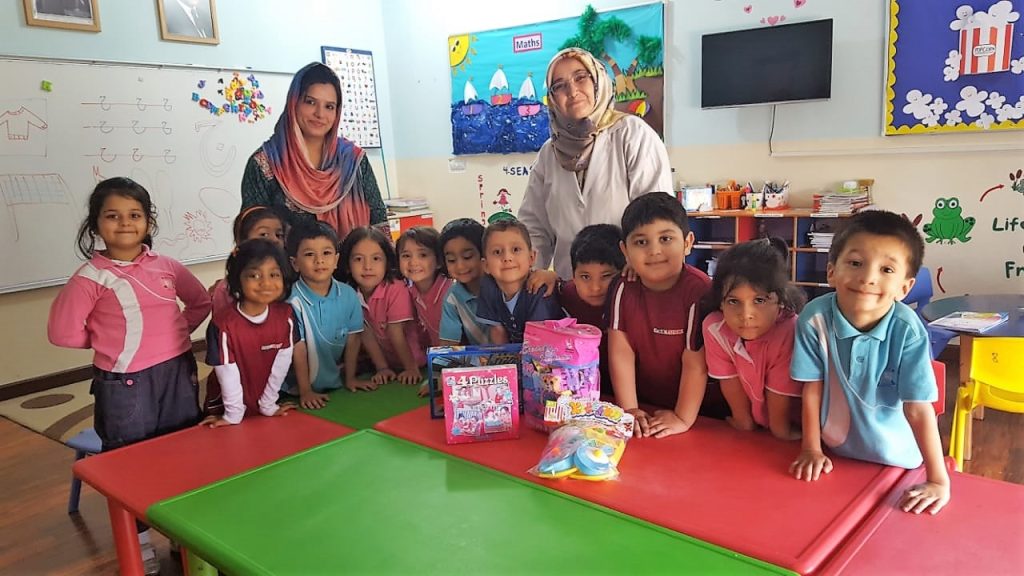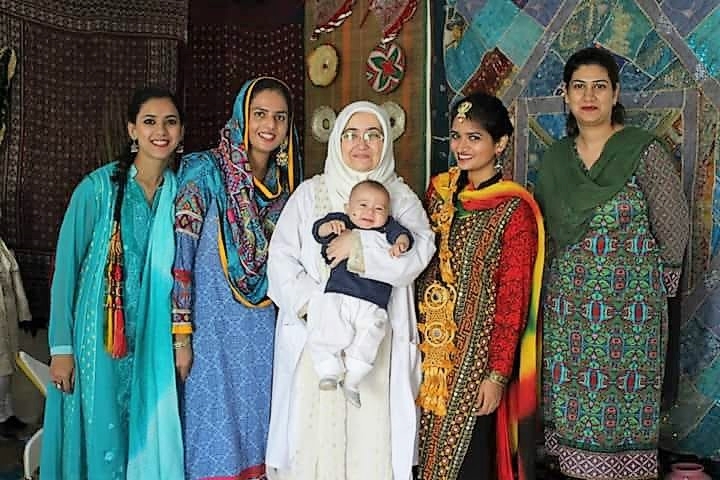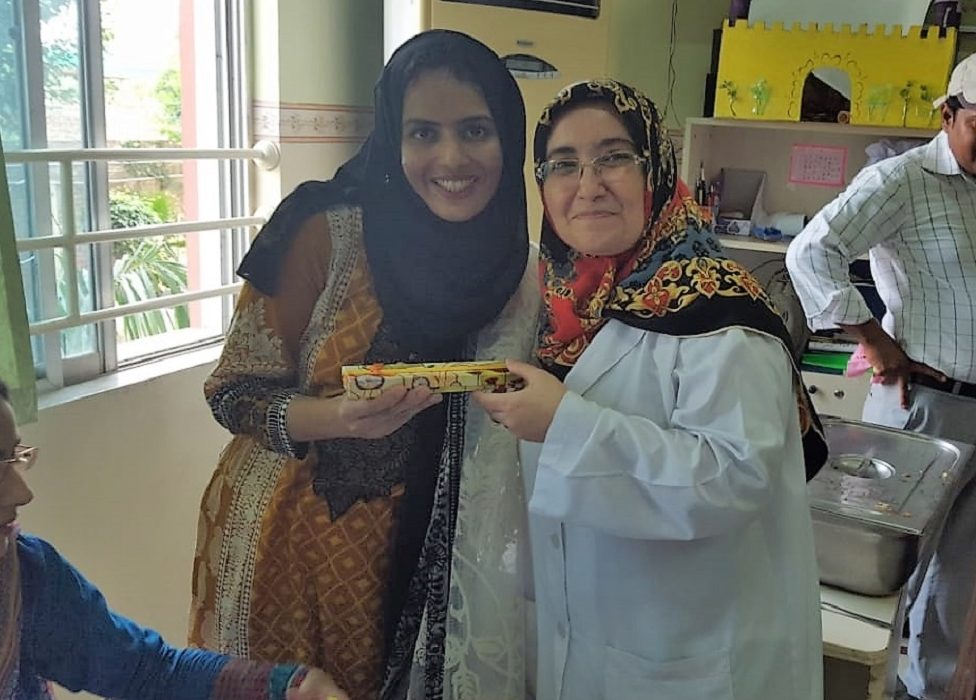Educationist Fatma Esra Tosun (2): I was never a stranger in Khairpur Mirs

My marriage decision and our wedding preparations
February 5, 2022
Educationist Engin Yiğit: What is taught with love lasts forever (Video)
February 10, 2022In this part of our interview, educationist Fatma Esra Tosun narrates her experiences in Khairpur Mirs, her first place of tenure in Pakistan. Expressing the parents’ deep sense of trust and love for the PakTurk teachers, Teacher Fatma says, “They would send their daughters, whom they did not send anywhere alone, to our homes for reading programs. Could there be any more trust than that?”
-What were your first impressions of Pakistan? Did it seem different to you from other countries where you lived?
We first landed in Karachi and immediately transited to Khairpur Mirs from there. As someone who lived in Africa, I may easily say I have never seen a place as hot and humid as Khairpur Mirs. We used to take a rickshaw with our children from home to school. The rickshaw would zigzag among the slow-moving buffalo herds on our right and left. Worried, I would keep the children away from their shaking tails. “Won’t these slam and knock us down?” I used to ask the rickshaw driver. “No problem!” he would reply at full ease. Pakistanis are very easy-going people, indeed. We lived in Khairpur Mirs for a year. My husband and I both taught at the school. I taught English, Turkish and Islamiyat.
-How was your rapport with students and parents in Khairpur Mirs? Are there any memories you cannot forget?
I never felt like I was in a foreign country considering the people in Pakistan, especially in Khairpur Mirs. People there had an exclusive aura of sincerity there. Whenever I felt bored, I would visit my Pakistani friends or neighbours. I would cook something and go to them, and they would also come. Our students would also invite us directly, and we would go. If I had to leave my child to someone, for example, before going to the hospital, I would leave him with them. I never thought myself as a foreigner there. They were like my brothers, my aunts, my sisters. They made me feel such closeness. I never considered them as separate people from us. They would invite us to their weddings and other functions; they would even make me take oaths to honour their invitation, “You will definitely come!” they would say. We would go to the weddings, and they would invite us to sit in seats of honour.
I never forget, when I went to a local wedding for the first time, I saw everyone ate with their hands. There was no spoon or fork on the table. I was not used to eating with hand. “Do you have a spoon?” I timidly asked, it turned out there was none. Someone from the wedding party rushed and fetched some spoons and forks for us at that moment. Even while the wedding reception was buzzing, they immediately rushed to help us. I became so upset when I realized the situation. “Why did you do that?” I asked. “It was not necessary for me to eat. If I had to, I’d dip my bread into the stew and eat it so, I had just asked unawares.”
I BREATHE FIRE MORE THAN A DRAGON; STAND ASIDE OR GET BURNED!
Khairpur Mirs is a somewhat more conservative place as seen in some parts of Pakistan. Even if it may be the house of her closest relative, a girl cannot stay at will in someone else’s house. There is such a precise understanding. A girl does not walk alone on the road and does not get into a car alone. Even if he may be younger than herself, she must be accompanied by a male. I used to organize study and book reading programs at my home for 9th grade female students; parents would send their children without question. All I had to do was phone the parents. I was very surprised by this. It meant we had established a trust. Back then, they didn’t know me well. My husband would leave home whenever the students had to come anyway; parents would not send their daughters even to their own relatives but to our home. At times, the students also stayed overnight. We would spend time together. Sometimes I would take them along to have a soft drink at an outlet or to shopping without a chaperon.

-Even though they did not know you personally, there was love and trust towards the PakTurk teachers, so you experienced its effects.
Yes, definitely. For example, we used to visit parents at their homes. They were so welcoming and complimenting. May Allah be pleased with them; I never felt myself a stranger there. I can swear to this. The hearts were true and so welcoming. Spices and hot sauces are inherent to their food culture, but since I couldn’t eat spicy food, they used to cook ‘spice-free’ meals especially for me. The biryani cooked in Khairpur Mirs is extremely spicy but very delicious. One day, my students invited me to their home and I went. They said, “We definitely cooked the food as spice-free for you.” Trusting them, I took the first spoon with ease, but it was so spicy that I could neither swallow nor remove the piece. Later, when they explained later, the students said, “Ma’am, your face turned liver-tone crimson. You were that red in the face.” It would be a shame if I removed what I had bitten, but I couldn’t swallow. My mouth was on fire. I don’t remember how I swallowed or how I got seared with spice. Then they asked fondly, “How’s it?” “A dragon has lesser firepower than mine to breathe right now. Do not stand in front of me, or I will burn you!” I said jokingly. I was that much burned. That was how spice-free it was. I got used to it over time. Nowadays we ourselves prefer to eat spicy food.
-We know that students of all faiths received education together at the PakTurk Schools. How did those differences reflect on your lessons and your rapport with the students?
We had our Hindu, Shiite and Sunni students as one. They never discriminated against one another or us. I wouldn’t even know the differences between them if the students didn’t tell themselves. Khairpur Mirs has a substantial Shi’ite population. I had 18 students of different faiths in my classroom. One day, I was explaining the concept of ‘martyrdom’ according to the syllabus. The children said, “Do you know, Ma’am, Elvan’s uncle is also a martyr!” I continued explaining the topic and asked at the end of the lesson, “Elvan, how did your uncle die a martyr?” When she replied, “During the time of maatam”, it felt as if something large fell on my head. I didn’t know what to say. The commemoration period in the holy month of Muharram is called maatam, the Mourning. Some beat their backs with sharp knives lined up in chains. While some do not seem harmed by that, you may see many people covered in blood. “My uncle said, ‘O ‘Ali!’ and hit his head with a knife. He was martyred for the sake of Hazrat Ali!” said the student.
I thought, “What can I say to this student?” then I said, “Yes, my daughters! “Can we ever compare our experiences with the troubles suffered by the Holy Prophet (peace and blessings be upon him) and his Companions in their era? Martyrs also have degrees. Elvan, may Allah elevate your uncle to high ranks in the Hereafter!” I will never forget that lesson. The children also wept. I said, “Come, let’s recite 3 Surah al-Ikhlas and 1 Surah al-Fatiha as gifts for the souls of martyrs.” The end of the lesson suddenly assumed a special spiritual atmosphere.
THIEF BROKE INTO OUR HOUSE, POLICE GAVE US A GUARD
Everyone knew us as it was a small place. For example, I used to phone the rickshaw whenever I had to go somewhere with the children. It was enough for me to say “It’s Fatima from PakTurk”. (In Pakistan, parents and local friends used to call me ‘Fatima’.) The rickshaw would arrive at our address right away.
Unfortunately, we also experienced a theft. It was after my husband left the house one day. I saw a young man pass through the roof. There was a glass section on the roof of the house, I noticed him from there. He actually was to enter from there, but he ran away when he noticed us. I said to my daughter “Take care of your brother”, grabbed a rolling pin and dashed out to chase the intruder. I am brave because I am a military girl. I went up to the roof, but the young man jumped on the roof of the neighbouring house and entered that house. I climbed down the roof and ran to the next house. I knocked on the door, but it did not open. “Open the door! Give that thief to me!” I said. A man snapped at me from behind the door. Again, I tried to explain. “What would you do if your spouse was alone at home and a stranger walked on the roof above her? I guess you either beat him or shoot him. You either give me the thief or I will call the police. Or else, things will turn sour!” I said. This time the man said things like, “What you foreigners are doing here? Get out of here!” It showed he had been bothered our presence.

I called the police. One officer frankly said, “You’re right all the way, but soon you will leave here and they will turn upon us!” The police even said the roof-walker was a young man they knew already; a young man who stole things as a hobby. A week later, while we were at school, the thief broke into our house again. The things he lifted were trivial! He took my spare glasses, my sunglasses, my son’s toy cars and his clothes and my daughter’s clothes. The only thing of value he stole was a digital camera. It was not a serious theft. After that incident, the police department assigned police protection to our house. An armed police officer stood guard at our door round the clock until we left Khairpur Mirs.
-You had arrived in Khairpur Mirs with small children. Could they adapt? Did you have any problems?
My daughter Nevin had difficulties with learning another foreign language, because she had learned basic French in Senegal. She had taken Arabic and French lessons in Mauritania. In Pakistan, the media of instruction were English and Urdu. Poor girl was simply confused. During the 8 months after her arrival in Pakistan, she wept helplessly saying “Mom, which language am I going to speak and write?” It was very difficult back then. She used to weep indoors and we used to weep outdoors. We kept on asking ourselves, “What are we going to do about this girl’s language issues?” Thankfully, she learned Urdu and English very well after 8 months. She now speaks 5 languages fluently. She is still proficient in Urdu.
When we settled in Khairpur Mirs, we also found a caretaker lady, whom we called ‘baji’ in local tongue, for my 9-month-old son. I used to take my son to school and leave him to the caretaker while I taught. I used to take care of him during the breaks. The school building in Khairpur Mirs is L-shaped and the doors of the classrooms open towards the playground. The caregiver had to walk the child in the playground. I used to tell her, “Baji, do not pass in front of the class while I’m teaching.” As if I hadn’t told her anything, she would take the child in her arms and walk slowly past the classroom door. Since the weather was scorching hot, the doors and windows would always be open in the classroom. While I was teaching, the child would hear my voice and cry. It would then become impossible for the caretaker to hold him anymore. I had to repeatedly warn the caretaker to set the ceiling fan in the nursery to slow speed. The child, who was already sweating from the heat, would catch a cold whenever he was placed under a high-speed fan. No matter how much I warned, the caretaker kept on speeding up the ceiling fan even before I left the nursery. While we struggled to keep the ceiling fan in slow or fast speed, my child got sick. He had trouble breathing. We took him to the doctor at different times, but could not receive a proper treatment.
One day, when he got sick again, we took our child to the doctor, who merely said, “The child is dead!” I fainted just as I heard those words. I learned later my husband had said to the doctor that the child had not been dead; he had struggled to make the doctor to do something. He had even looked for a mirror to hold to our child’s mouth and prove that he had been breathing. However, the doctor had simply said, “Dead!” and done nothing. Eventually, I regained consciousness. When we could not reason with the doctor, we took our child and left the hospital. We arranged a car. It took exactly 7 hours from Khairpur Mirs to reach Karachi by car. I don’t remember driving anywhere else so fast in my life, but those 7 hours felt as if they were 70. My son was 11 months old. We immediately admitted him to a research hospital. The doctors placed him under treatment, but both I and my husband passed out there. We had been devastated along the way. After 10 days, our child showed slight improvement, but his health continued to be upset at the smallest thing. Khairpur Mirs tested us for sickness. Shortly later, we were relocated to Islamabad. Alhamdulillah, but it hurt so much when we had to say goodbye to Khairpur Mirs.
To be continued…
***
Part One: Educationist Fatma Esra Tosun’s journey leading from İzmir to Siberia and Africa to Pakistan (1)





No Comment.